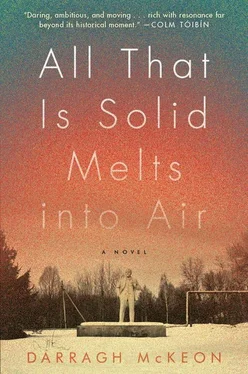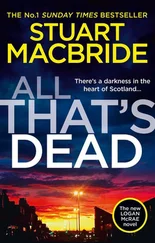They call for serious military support and medical equipment. They discuss evacuation. Grigory agrees to remain patient until the proper transport can be arranged, so he appoints an evacuation committee to form a strategy and gives them strict deadlines. He orders iodine tablets to be dispensed amongst the population and is informed they have only one box. Grigory asks how many pills the box contains and the official replies casually that there are approximately one hundred. Grigory feels an urge to strike the man. One box, in a town of sixty thousand, a town located next to, built for, a nuclear power plant. Grigory says, “I’m sure you looked after yourself, though,” and the man remains silent.
He drives to the plant with Vygovskiy and Vasily. They want to see it for themselves. Firemen are still working on the roof, dead on their feet, wild-eyed with exhaustion. Vygovskiy orders them to cease their work. Now that the blaze has been dampened, their continuing to flood the reactor with water is counterproductive, resulting in nothing more than an increase in the level of water vapour, which floods into the other buildings.
Rubber facemasks have been delivered, and Grigory orders everyone to wear them. They put them on and all traces of personality are erased; everyone now moves and walks with a sinister sameness, an inhuman mien. Hair becomes important for identification purposes. Vygovskiy recognizes people by remembering their hair: blond or black, crew-cut or curly. Voices filter through the masks as if disembodied.
They are still running the other reactors. Grigory hears a junior engineer mention this, then asks him to repeat it and he does so twice, only realizing the stupidity of this circumstance after repeating it the first time. Operators are still in their respective control rooms, going about their daily work, while ventilation systems pump contamination throughout the building. Vygovskiy grabs the man’s lapels and pushes him backwards, and the man turns midstumble and runs in the direction of the reactors.
Local farmers arrive at the gate with food and drink. They’re sent away. The farmers are confused, saying all their food is fresh; they state the fact that they’re farmers, as if the soldiers guarding the gates are too blind to notice. The soldiers call Grigory over to confirm what they are saying and the farmers still protest, not understanding how their generosity could be taken as such an affront. The soldiers have to point their guns at them, and the locals back away, baffled and spiteful.
Grigory and Vasily sleep for a few hours in an apartment in the town. When Grigory enters the bedroom he throws his clothes into a waste bin beside the bed, tying a knot in the plastic bag and placing it in a cupboard in the hallway, which doesn’t make them any safer but at least it’s out of sight. He washes his hair with rubber gloves. He is hungry, he realizes he hasn’t eaten since breakfast. In the kitchenette Vasily finds two cans of chopped tomatoes, he takes a tin opener and peels off the lid. Such a pitiful meal. They clink their cans with irony and gulp down the contents. Outside the window, some kids are drag-racing beat-up old cars. The two men know they could have them stopped or moved but decide not to; the high pitch of the engines and the squeal of tyres are at one with the rip of thoughts through their heads, acting as a counterbalance, distracting them from what’s happening all around. Grigory sleeps without rest, a shallow submission of the mind to his bodily needs.
Dawn rises over the plant and the familiar crimson sky reshapes itself. A squadron of helicopters thunder overhead and place themselves daintily on the surrounding countryside. Vygovskiy has decided to dampen the reactor core, using the helicopters to drop boron compounds—clay, dolomite, and lead—onto the site to stabilize the temperature. The substances are to be packaged and attached to small parachutes to avoid dispersion in the wind.
Nesterenko, the commanding officer, looks upwards towards the network of steel cables above the drop site, silently calculating the risks involved. He’s come directly from Afghanistan. Twelve hours earlier he had been stationed in a battleground, and it’s obvious he would rather remain in a tangible conflict than be placed in this alien landscape battling chemical releases. The hazards would make each passing incredibly dangerous for his pilots: navigation through these wires will be intricate. Sheets of lead have been transported in, and these will have to be secured to the underside of the helicopters to protect them from the powerful blasts of radiation. There can be no predicting what effect this would have on the stability of the craft. Had he designed the exercise to test the expertise of his men, he couldn’t have devised anything more difficult.
Soldiers are spread wide across the next field attaching tiny parachutes to the cloth packages that will be dropped. Their uniforms are combat-worn; scuffed and ripped with details such as buttons or badges missing.
Grigory and Vasily ask to be included on one of the initial flights. They have been soldiers too; they know how these men think and they understand that having members of the official delegation on board will serve as an expression of solidarity with the troops, reassuring them and anchoring their leadership through more difficult times to come. The colonel advises against it, but they insist.
When the first helicopter is sent up, the whole field stops and stares, watching it thread its way through the smoke. A cheer rises up when the packages are dropped.
DURING THE SIX months of their military service, the two friends spent countless nights on their own, supposedly learning battle-simulation tactics but in reality just being cold and wet and more than a little homesick. There were many days when they were sent from the base with a map and compass and a radio with a faulty connection to dig in for a few nights. Vasily called these the filler nights, when the commanding officers obviously hadn’t planned any training activities, so they just sent the recruits out into the wilds to give themselves a break.
Grigory and Vasily carried their Ustavs, making sure the pages never got wet, and they set about memorizing every page, which was more an ideological ambition on the part of their commanding officers, but they were still young men, both eighteen, and they had a burning intention to do this well. They concentrated on the sections they were most often quizzed on: the sections on uniform and dress and appearance. They could both still quote copious amounts of the text— The fly of the trousers shall hang at a perpendicular angle to the waistband. The teeth of the zip shall remain free of foreign bodies and should be attended to biweekly with a toothbrush. The crease of the trouser should begin at the midpoint of the thigh and not deviate in its line to the end of the leg —and they indulged in recalling it sometimes, on drunken evenings. Vasily’s wife, Margarita, became so familiar with their incantations that when she heard the first words she’d lift the dishes from the table, carrying them to the sink as an amused rebuke.
When the friends met, they both had a year of medical school behind them and their brains had been attuned to learning difficult Latinate terms, so their Ustav was relatively straightforward by comparison. But all their learning never improved their situation. When they stood to attention, their sergeant would still find flaws or would invent some. And their knowledge, their readiness with an answer, often made them look arrogant, and so after they’d waded through the first sections they skimmed past the rest, happy with a more generalized knowledge, more knowing now, more aware of the absurdities of military practice and decorum. These were all the nuances they’d picked up before their training turned to hand-to-hand combat, and this created a new phase of study where they’d test each other’s technical accuracy by striking the poses captured by the line-drawing figures in the pages, imitating also their facial expressions, the nonchalant gaze or cold-blooded fury of these basic illustrations. Laughing at the earnestness of their former selves.
Читать дальше












